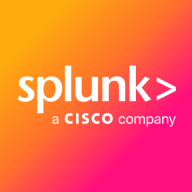

Splunk Enterprise Security and Exabeam compete in the security information and event management (SIEM) category. Splunk has a slight edge because of its extensive feature set and strong community support.
Features: Splunk Enterprise Security provides robust log management, rapid search capabilities, operational intelligence, scalability, customizable dashboards, and extensive data ingestion. It offers search processing language for flexibility. Exabeam focuses on simplicity, advanced behavior analytics, machine learning, and automation features. Its timeline creation helps in security investigations.
Room for Improvement: Splunk's GUI, search query performance, flexibility in permissions, and cost issues could be improved. It also needs better integration capabilities. Exabeam requires enhanced integration capabilities, documentation, and dashboard customization, as well as improved cloud-native and hybrid environment integration. Both should refine alert management, filtering, and machine learning adaptiveness.
Ease of Deployment and Customer Service: Splunk offers versatile deployment options including public cloud, on-premises, and hybrid cloud. While its support staff is knowledgeable, there is room to improve response times. Exabeam, with a focus on on-premises and public cloud, provides an easy setup process and receives positive feedback for customer service, though handling complex requests could be improved.
Pricing and ROI: Splunk’s pricing model, based on data volume, can be costly but potentially offers significant ROI through time savings and efficiency. Exabeam's pricing is more competitive but lacks the feature scale of Splunk. Both solutions require substantial investment, with Splunk being more expensive but justified by its comprehensive security features.
Exabeam offers more machine learning models that detect anomalies.
The documentation for Splunk Enterprise Security is outstanding. It is well-organized and easy to access.
We couldn't calculate what would have been the cost if they had actually gotten compromised; however, they were in the process, so every investment was returned immediately.
On average, my SecOps team takes probably at least a quarter of the time, if not more, to remediate security incidents with Splunk Enterprise Security compared to our previous solution.
Even with TAM support from Exabeam, many issues go unresolved.
I also had the chance to look at the documentation, and the documentation is good.
We have paid for Splunk support, and we’re not on the free tier hoping for assistance; we are a significant customer and invest a lot in this service.
I have had nothing but good experiences with Splunk support, receiving timely and helpful replies.
We've had great customer success managers who have helped us navigate scaling from 600 gigs to 30 terabytes.
Regarding Exabeam's scalability and how well it adapts to its customers' needs, I would rate it an eight.
We currently rely on disaster recovery and backup recovery, which takes time to recover, during which you're basically blind, so I'm pushing my leadership team to switch over to a clustering environment for constant availability.
It is one of the things that separates it from other tooling, and if not, it is the most scalable solution out there.
They struggle a bit with pure virtual environments, but in terms of how much they can handle, it is pretty good.
These problems were not frequent, and the last six to eight months have been stable.
Overall, I think Exabeam's stability level is good.
They test it very thoroughly before release, and our customers have Splunk running for months without issues.
Splunk has been very reliable and very consistent.
We need more SMEs, and there is no mechanism to tell us about indexer or search head issues.
Exabeam needs to improve its documentation and provide more customization for dashboards and case management.
I have explored the SaaS version; it offers many new features.
Exabeam's integration capabilities are not good, as Exabeam has a very limited number of integrations and no out-of-box integration.
Improving the infrastructure behind Splunk Enterprise Security is vital—enhanced cores, CPUs, and memory should be prioritized to support better processing power.
Splunk Enterprise Security is not something that automatically picks things; you have to set up use cases, update data models, and link the right use cases to the right data models for those detections to happen.
For any future enhancements or features, such as MLTK and SOAR platform integration, we need more visibility, training, and certification for the skilled professionals who are working.
I saw clients spend two million dollars a year just feeding data into the Splunk solution.
The platform requires significant financial investment and resources, making it expensive despite its comprehensive features.
I find it to be affordable, which is why every industry uses it.
Exabeam's AI capabilities, like the natural language mode, convert natural language into Exabeam queries, enhancing ease of use.
The product offers useful features like the dashboard, timeline, and session views, which enhance our security tools.
Exabeam's UEBA is the most valuable feature that I have found so far.
This capability is useful for performance monitoring and issue identification.
I assess Splunk Enterprise Security's insider threat detection capabilities for helping to find unknown threats and anomalous user behavior as great.
Splunk Enterprise Security provides the foundation for unified threat detection, investigation, and response, enabling fast identification of critical issues.
| Product | Market Share (%) |
|---|---|
| Splunk Enterprise Security | 7.1% |
| Exabeam | 1.6% |
| Other | 91.3% |
| Company Size | Count |
|---|---|
| Small Business | 12 |
| Midsize Enterprise | 4 |
| Large Enterprise | 7 |
| Company Size | Count |
|---|---|
| Small Business | 109 |
| Midsize Enterprise | 50 |
| Large Enterprise | 264 |
Exabeam Fusion is a cloud-delivered solution that that enables you to:
-Leverage turnkey threat detection, investigation, and response
-Collect, search and enhance data from anywhere
-Detect threats missed by other tools, using market-leading behavior analytics
-Achieve successful SecOps outcomes with prescriptive, threat-centric use case packages
-Enhance productivity and reduce response times with automation
-Meet regulatory compliance and audit requirements with ease
Splunk Enterprise Security delivers powerful log management, rapid searches, and intuitive dashboards, enhancing real-time analytics and security measures. Its advanced machine learning and wide system compatibility streamline threat detection and incident response across diverse IT environments.
Splunk Enterprise Security stands out in security operations with robust features like comprehensive threat intelligence and seamless data integration. Its real-time analytics and customizable queries enable proactive threat analysis and efficient incident response. Integration with multiple third-party feeds allows detailed threat correlation and streamlined data visualization. Users find the intuitive UI and broad compatibility support efficient threat detection while reducing false positives. Despite its strengths, areas such as visualization capabilities and integration processes with cloud environments need enhancement. Users face a high learning curve, and improvements in automation, AI, documentation, and training are desired to maximize its potential.
What Are the Key Features of Splunk Enterprise Security?In specific industries like finance and healthcare, Splunk Enterprise Security is instrumental for log aggregation, SIEM functionalities, and compliance monitoring. Companies leverage its capabilities for proactive threat analysis and response, ensuring comprehensive security monitoring and integration with various tools for heightened operational intelligence.
We monitor all Security Information and Event Management (SIEM) reviews to prevent fraudulent reviews and keep review quality high. We do not post reviews by company employees or direct competitors. We validate each review for authenticity via cross-reference with LinkedIn, and personal follow-up with the reviewer when necessary.